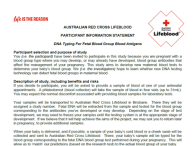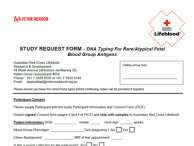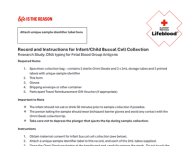NIPT Massively Parallel Sequencing (MPS) for Clinically Significant Fetal Antigens
Important note: This study is for atypical antigens and is separate to the NATA accredited testing already offered by Lifeblood. Please contact the Lifeblood Red Cell Reference Laboratory for information regarding NATA accredited testing for clinical use.
November 2025
Australian Red Cross Lifeblood Research and Development is assessing the feasibility of non-invasive prenatal testing (NIPT) for blood group genotyping. NIPT is for clinically significant atypical fetal antigens, focusing on pregnancies at risk of haemolytic disease of the fetus and newborn (HDFN) and/or fetal and neonatal alloimmune thrombocytopenia (FNAIT).
The test will enable prediction of clinically significant fetal antigens via testing for cell-free fetal DNA, present in the mother’s peripheral blood, using a technique called massively parallel sequencing. The key potential advantages are:
- Screening for an extended number of clinically significant red blood cell and platelet antigens in one test (see FAQs below for panel information)
- Inclusion of internal fetal control markers
- Providing fetal genotyping in a single, non-invasive test from 12 weeks gestation.
Please note that this testing is not yet accredited. Results are for research use only. Please contact our Red Cell Reference Laboratory for information regarding NATA accredited testing for clinical use.
NIPT avoids the requirement for amniocentesis as cell-free fetal DNA can be extracted from the mother’s peripheral blood and analysed for the presence of the antigen targets of interest.
Testing can be performed from 12 weeks gestation and will require up to 31 mL of blood to be collected. Samples should arrive at Lifeblood within 72 hours of collection. Please see the FAQs below (or download a copy) for sample collection requirements.
FAQs
- What is NIPT sequencing?
Non-invasive prenatal testing (NIPT) via massively parallel sequencing (MPS) is a molecular blood group genotyping assay for clinically significant fetal antigens. It’s under development in Lifeblood R&D to help predict the blood group phenotype of the fetus.
We’re developing a MPS assay to detect a panel of clinically significant fetal from cell-free fetal DNA. The advantages of this technique include:
- Screening for an extended number of clinically significant red blood cell and platelet antigens in one test (see ‘What do we test for?’ below for panel information)
- Inclusion of internal fetal control markers
- Providing fetal genotyping in a single, non-invasive test from 12 weeks gestation
Please note that this testing is not yet accredited. Results are for research use only.
- When is NIPT performed?
NIPT is performed when the mother is antigen negative and has a corresponding alloantibody, placing the fetus at risk of being affected by HDFN, or if there is concern for FNAIT.
- What makes NIPT non-invasive?
NIPT uses maternal peripheral whole blood samples. Cell-free DNA, which contains cell-free fetal DNA is extracted from maternal plasma. The cell-free fetal DNA is analysed for the presence of the gene or molecular variation responsible for (or associated with) the blood or platelet group phenotype under investigation.
- What do we test for?
The testing is performed using a custom QIAGEN panel, which covers a range of common clinically significant antigens for the following blood and platelet groups. Please be aware that the panel does not include all antigens in the listed blood groups, and not all HPA antigens are covered.
Red blood cell systems Human platelet antigens MNS HPA-1 RH (RHD/RHCE including RHD variants) HPA-2 LU HPA-3 KEL HPA-4 FY HPA-5 JK HPA-15 DI CO GE VEL AUG CTL2 MAM - How do we test?
The assay is performed using a custom QIAGEN QIAseq™ Targeted DNA Panel designed to cover red blood cell and human platelet antigen allelic polymorphisms across 13 blood group systems and six platelet systems, respectively, in addition to fetal control markers. The QIAseq 12-index I kit is used to label each sample with adapters containing sequences for sample barcoding. Paired-end sequencing is then performed on an Illumina MiSeq. Maternal genomic DNA (gDNA) samples are tested in tandem with the cell-free DNA (cfDNA) sample. FASTQ files generated from sequencing the cfDNA and gDNA samples are input to a customised bioinformatics workflow using CLC Genomics Workbench software (QIAGEN) to determine the frequency of fetal antigen signals present. Non-specific background reads (commonly associated with massively parallel sequencing methods) are accounted for by subtracting the maternal gDNA allele frequency from the cfDNA allele frequency, forming the ‘subtractive allele frequency’ (SAF). The SAF is used as the threshold for positive and negative fetal antigen predictions during results interpretation, as detailed in 'How are the results interpreted?' below.
- How does the assay perform?
The assay has a ≥99.9% positive predictive value and a ≥ 97.1% negative predictive value. The accuracy based on the study data is 98.5% with a 95% confidence interval of 91.9% to 99.9%. A proportion of samples will be reported as inconclusive. In this instance a repeat sample will be requested.
- How are the results interpreted?
Final patient cfDNA interpretation takes into account the combination of results obtained for patient cfDNA (blood group allele and housekeeper) and maternal gDNA (blood group allele and housekeeper). Criteria for the subtractive allele frequency (SAF) are shown below.
For more information, see McGowan EC et al. Feasibility for non-invasive prenatal fetal blood group and platelet genotyping by massively parallel sequencing: A single test system for multiple atypical red cell, platelet and quality control markers. Br J Haematol. 2023;00:1–12.Fetal antigen status result Criteria Negative SAF <1.0% Positive SAF ≥2.5% Inconclusive SAF ≥1.0% to <2.5% A research report will be generated and emailed, via ‘Secure Send’, to the referring clinician.
- How early in the pregnancy can samples be tested?
Gestational age must be at least 12 weeks. The concentration of fetal DNA in the mother’s blood increases with the progression of the pregnancy. Any sample collected before 12 weeks gestation can lead to inconclusive or false negative results.
- How is NIPT applied for cases of multiple pregnancy (i.e twins)?
There is limited data demonstrating the feasibility of NIPT for monozygotic (identical) and/or dizygotic (fraternal) twin pregnancies. We can only report on cases involving monozygotic pregnancies at this stage.
However, we are happy to accept samples from dizygotic pregnancies as the resulting information is valuable for further developing the NIPT system.
- What are the sample requirements?
- A whole blood sample of 1 x 4mL EDTA and 3 x 9 mL maternal cell stabilising tubes, either Roche or Streck is required. (Lithium Heparin samples are not suitable.)
- Roche tubes can be requested from Lifeblood Research (atypicalNIPT@redcrossblood.org.au).
- It is possible to test a sample sent in differing combinations of EDTA and maternal cell stabilising tubes, but this is not preferable. Please contact atypicalNIPT@redcrossblood.org.au to discuss.
- Sample collection should be planned to ensure they are received for processing within 72 hours of collection.
- Samples should be stored at 2-8 °C.
- Samples must be provided with completed ‘Study request form’ with a minimum of 3 patient identifiers and include the tests requested, referring organisation’s contact details and any relevant clinical information.
- It is very important to include the requesting clinicians’ email for correspondence and reporting.
- Testing cannot be completed without a signed ‘Consent form’, which is also available online at the same location as the ‘Study request form’. Please send both the study request form and signed consent form together.
- The identifiers on the sample must match the request form exactly.
- Samples should be sent packaged with a cold ice-brick to the QLD Research and Development Laboratory, via the address below as soon as possible following collection:
Research and Development, Attention Catherine Hyland
Australian Red Cross Lifeblood
44 Musk Avenue (delivery via Blamey Street)
KELVIN GROVE
QLD 4059
AUSTRALIA
- What is the testing turnaround time?
Sequencing is performed in batches of 5 samples. This can lead to delays in testing if numbers are limited. The average turnaround time is 8 weeks. If there is urgency for testing, please contact atypicalNIPT@redcrossblood.org.au to discuss.
- Follow up samples
As part of the study, we request a follow up sample from the baby to be provided after delivery, in either the form of a cord blood sample or buccal swab collection. Cord blood samples can be sent using the study request form, while buccal swab samples require the use of the Buccal Swab Collection form.
- All other enquiries
Please direct sample collection and shipment enquiries to the Research and Development team via atypicalNIPT@redcrossblood.org.au.
Please direct all clinical enquiries to the Transfusion Specialist for your state. The contact details are available here: Contact | Lifeblood


